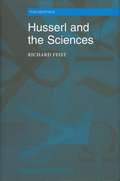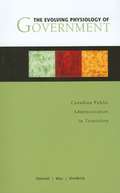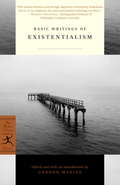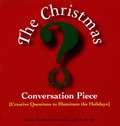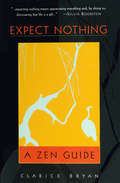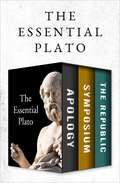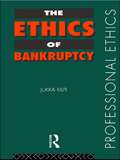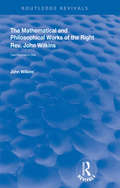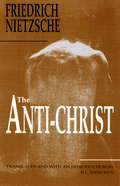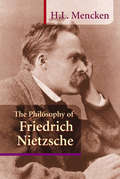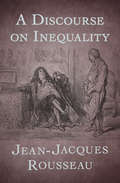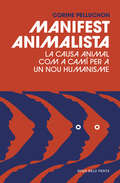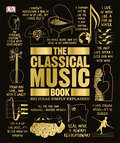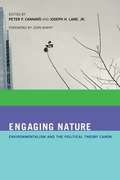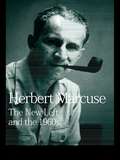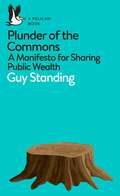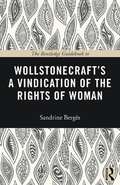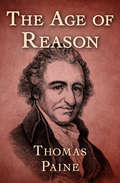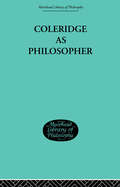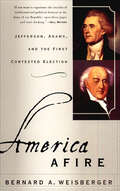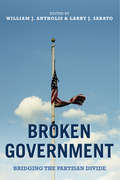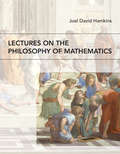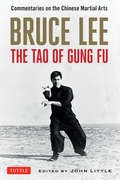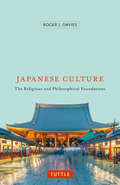- Table View
- List View
Husserl and the Sciences: Selected Perspectives (Philosophica)
by Richard FeistEdmund Husserl (1859-1938) is one of the previous century's most important thinkers. Often regarded as the "Father of phenomenology," this collection of essays reveals that he is indeed much more than that. The breadth of Husserl's thought is considerable and much remains unexplored. An underlying theme of this volume is that Husserl is constantly returning to origins, revising his thought in the light of new knowledge offered by the sciences.
The Evolving Physiology of Government: Canadian Public Administration in Transition (Governance Series)
by O. P. Dwivedi Tim A. Mau Byron M. SheldrickCanadian public administration has provided a rich ground for examining the changing nature of the state. Currents of political change have rippled through the administration of the public sector, often producing significant alterations in our understanding of how best to organize and administer public services. This volume brings together some of the leading Canadian and international scholars of public administration to reflect on these changes and their significance. Providing a historical perspective on public administration in Canada, the volume examines the shift from a traditional model of administration to newer forms such as new public management and governance, and explores current debates and the place of Canadian public administration within a broader comparative perspective.
Basic Writings of Existentialism
by Gordon MarinoBasic Writings of Existentialism,unique to the Modern Library, presents the writings of key nineteenth- and twentieth-century thinkers broadly united by their belief that because life has no inherent meaning that humans can discover, we must determine meaning for ourselves. This anthology brings together into one volume the most influential and commonly taught works of existentialism. Contributors include Simone de Beauvoir, Albert Camus, Fyodor Dostoevsky, Ralph Ellison, Martin Heidegger, Søren Kierkegaard, Friedrich Nietzsche, Jean-Paul Sartre, and Miguel de Unamuno y Jugo.
Christmas Conversation Piece
by Bret Nicholaus Paul LowrieWhat one Christmas tradition would you never want to give up? If you could spend Christmas anywhere in the world, where would you most want to be? If you could have visited the Christ child just as the Three Kings did, what would you have brought as a gift? You've been chosen to host a sensational Christmas celebration on TV: What three guests would you choose to make it the best Christmas special ever? The Christmas Conversation Pieceoffers these and many other questions to pose and ponder during a season of both deep reflection and unabashed merriment. This charming volume--the perfect stocking stuffer--will provide you, your family, and your friends with twelve days of surprising and amusing Yuletide questions. Who would you most like to meet under the mistletoe? Your answer just may change by Christmas Eve!
Expect Nothing
by Clarice BryanA inspiring & instructional guide to living out the powerful Zen tenet: by expecting nothing, we gain everything.
The Essential Plato: Apology, Symposium, and The Republic
by PlatoThree Socratic dialogues by the ancient Greek philosopher who established the foundations of Western thought. Apology: In this classic text, Plato recounts the trial of his mentor Socrates, who stands accused of rejecting the gods and corrupting the youth of Athens. As recounted by Plato, Socrates defends himself with a profound examination of integrity, citizenship, the nature of truth, and the role of a philosopher. Symposium: Here Plato depicts a group of Athenian intellectuals discussing the nature of desire. One after another, Agathon, Aristodemus, Eryximachus, Pausanias, and Aristophanes share their perspectives on gender, love, sexuality, and human instincts. The dialogue culminates in the radical views of Socrates, who advocates transcendence through spiritual worship. The Republic: Plato&’s magnum opus is a wide-ranging and deeply influential meditation on society as a whole. Plato explores the concept of justice, the connection between politics and psychology, the difference between words and what they represent, and the roles of art and education, among many other topics.
The Ethics of Bankruptcy (Professional Ethics)
by Jukka KilpiThe fundamental ethical problem in bankruptcy is that insolvents have promised to pay their debts but can not keep their promise. The Ethics of Bankruptcy examines the morality of bankruptcy. The author compares and contrasts the Humean doctrine of promises as useful conventions with the Kantian view of autonomous agency constituting promissory obligations; he explores ethical concerns raised by forgiveness, utilitarianism and distributive justice and the moral aspects of insolvents' contractual, fiduciary, tortious and criminal liability. Finally, the author assesses recent bankruptcy law reforms. Bankruptcies severly hurt creditors and society. For the insolvents and their families the experience is painful and stigmatising, yet philosophers have paid little attention to the moral aspects of this violent social phenomenon. The Ethics of Bankruptcy is the first comprehensive study that employs the tools of ethics to examine the controversies surrounding insolvency, which makes valuable and sometimes controversial reading in a decade recovering from the Recession.
The Mathematical and Philosophical Works of the Right Rev. John Wilkins (Routledge Revivals)
by John WilkinsOriginally published in 1708, this volume is an exact facsimile reproduction the 1802 edition of The Mathematical and Philosophical Works of the Right Rev. John Wilkins, and includes an index, added for the 1970 new impression. The book includes the works of Bishop John Wilkins, as well as a note on the life of the author; Bishop John Wilkins, as Warden of Wadham Colelge, Oxford and Master of Trinity College Cambridge, played a major role in the revitalization of British university education in the middle of the seventeenth century. Moreover, he was a prime mover in the establishment of the Royal Society of London and was its first secretary.
The Anti-Christ
by H. L. Mencken Friedrich NietzscheThis is Nietzsche's last book and a fitting capstone to his career. It's succinct, biting, and encapsulates the criticisms of Christianity found in his other works. This edition contains an 8,000-word introduction by its translator, the famous iconoclastic writer H. L. Mencken.
The Philosophy of Friedrich Nietzsche
by H. L. MenckenThe first book on Nietzsche ever to appear in English, this examination by legendary journalist H. L. Mencken is still one of the most enlightening. Mencken wrote this book while still in his 20s, but his penchant for thoroughness was evident even at that young age--in preparation for writing this book, he read Nietzsche's works in their entirety, mostly in the original German. A brief biographical sketch is followed by clear and thorough explanations of Nietzsche's basic concepts and attitudes. Analyzed are Nietzsche's much-misunderstood concept of the superman, his concept of eternal recurrence, his rejection of Christianity, and his basic rationalism and materialism. Included are two essays on Nietzsche that appeared in Mencken's magazine The Smart Set subsequent to the publishing of the original edition of this book. Nearly a century after its original publication, this remains one of the clearest, most concise, and entertaining introductions to Nietzsche to date.
A Discourse on Inequality: A Discourse On The Origin Of Inequality, And A Discourse On Political Economy
by Jean-Jacques RousseauA fascinating examination of the relationship between civilization and inequality from one of history&’s greatest minds The first man to erect a fence around a piece of land and declare it his own founded civil society—and doomed mankind to millennia of war and famine. The dawn of modern civilization, argues Jean-Jacques Rousseau in this essential treatise on human nature, was also the beginning of inequality. One of the great thinkers of the Enlightenment, Rousseau based his work in compassion for his fellow man. The great crime of despotism, he believed, was the raising of the cruel above the weak. In this landmark text, he spells out the antidote for man&’s ills: a compassionate revolution to pull up the fences and restore the balance of mankind. This ebook has been professionally proofread to ensure accuracy and readability on all devices.
Manifest animalista: La causa animal com a camí per a un nou humanisme
by Corine PelluchonLa violència contra els animals és un atac directe a la nostra humanitat. Això demostra Corine Pelluchon en aquest breu, pragmàtic, i controvertit assaig que suposa una contribució radical a l'ètica i la filosofia política. Lluitar contra el maltractament animal és rebel·lar-se contra una societat basada en l'explotació, i per això la causa animalista és una qüestió política major que ens concerneix a tots, més enllà d'ideologies o conflictes d'interessos. Amb un estil viu, persuasiu i inspirador, l'autora proposa un camí possible i factible per portar aquest debat a l'esfera política amb tanta claredat i urgència com sigui possible. Ressenyes:«Corine Pelluchon ho explica tot absolutament bé en tot just un centenar de pàgines: per ser una alternativa vàlida, és imprescindible polititzar la causa animal.»Luce Lapin, Charlie Hebdo «L'objectiu principal de l'autora està completament assolit en aquest Manifest animalista: dóna al lector les claus que li permetran ampliar el radi d'acció de l'humanisme als animals.»Philippe Douroux, Libération «Una perspectiva bella i ambiciosa.»Isabelle Gravillon, Femme Majuscule «Un llibre d'intervenció política, tan compromès com lúcid.»Robert Jules, La Tribune «Una de les moltes i grans qualitats d'aquest Manifest animalista és que, en tot moment, el seu projecte està exposat de manera perfectament creïble i realitzable. Precisament per això, l'autora no es fa cap il·lusió sobre la dificultat que suposa introduir la qüestió animal en el debat polític.»Hicham-Stéphane Afeissa, Non Fiction
The Classical Music Book: Big Ideas Simply Explained (DK Big Ideas)
by DKLearn about the world&’s greatest classical compositions and musical traditions in The Classical Music Book.Part of the fascinating Big Ideas series, this book tackles tricky topics and themes in a simple and easy to follow format. Learn about Classic Music in this overview guide to the subject, great for novices looking to find out more and experts wishing to refresh their knowledge alike! The Classical Music Book brings a fresh and vibrant take on the topic through eye-catching graphics and diagrams to immerse yourself in. This captivating book will broaden your understanding of Classical Music, with:- More than 90 pieces of world-famous music - Packed with facts, charts, timelines and graphs to help explain core concepts- A visual approach to big subjects with striking illustrations and graphics throughout- Easy to follow text makes topics accessible for people at any level of understandingThe Classical Music Book is a captivating introduction to music theory, crucial composers and the impact of seminal pieces, aimed at adults with an interest in the subject and students wanting to gain more of an overview. Here you&’ll discover more than 90 works by famous composers from the early period to the modern day, through exciting text and bold graphics.Your Classical Music Questions, Simply ExplainedFrom Mozart to Mendelssohn, this fresh new guide goes beyond your typical music books, offering a comprehensive overview to classical music history and biography. If you thought it was difficult to learn about music theory, The Classical Music Book presents key information in an easy to follow layout. Explore the main ideas underpinning the world&’s greatest compositions and musical traditions, and define their importance to the musical canon and into their wider social, cultural, and historical context.The Big Ideas SeriesWith millions of copies sold worldwide, The Classical Music Book is part of the award-winning Big Ideas series from DK. The series uses striking graphics along with engaging writing, making big topics easy to understand.
The Cambridge Companion to Utilitarianism
by Ben Eggleston Dale E. MillerUtilitarianism, the approach to ethics based on the maximization of overall well-being, continues to have great traction in moral philosophy and political thought. This Companion offers a systematic exploration of its history, themes, and applications. First, it traces the origins and development of utilitarianism via the work of Jeremy Bentham, John Stuart Mill, Henry Sidgwick, and others. The volume then explores issues in the formulation of utilitarianism, including act versus rule utilitarianism, actual versus expected consequences, and objective versus subjective theories of well-being. Next, utilitarianism is positioned in relation to Kantianism and virtue ethics, and the possibility of conflict between utilitarianism and fairness is considered. Finally, the volume explores the modern relevance of utilitarianism by considering its practical implications for contemporary controversies such as military conflict and global warming. The volume will be an important resource for all those studying moral philosophy, political philosophy, political theory, and history of ideas.
Engaging Nature
by Peter F. Cannavò John Barry Joseph H. Lane Jr.Contemporary environmental political theory considers the implications of the environmental crisis for such political concepts as rights, citizenship, justice, democracy, the state, race, class, and gender. As the field has matured, scholars have begun to explore connections between Green Theory and such canonical political thinkers as Plato, Machiavelli, Locke, and Marx. The essays in this volume put important figures from the political theory canon in dialogue with current environmental political theory. It is the first comprehensive volume to bring the insights of Green Theory to bear in reinterpreting these canonical theorists.Individual essays cover such classical figures in Western thought as Aristotle, Hume, Rousseau, Mill, and Burke, but they also depart from the traditional canon to consider Mary Wollstonecraft, W. E. B. Du Bois, Hannah Arendt, and Confucius. Engaging and accessible, the essays also offer original and innovative interpretations that often challenge standard readings of these thinkers. In examining and explicating how these great thinkers of the past viewed the natural world and our relationship with nature, the essays also illuminate our current environmental predicament.Essays onPlato Aristotle Niccolò Machiavelli Thomas Hobbes John Locke David Hume Jean-Jacques Rousseau Edmund Burke Mary Wollstonecraft John Stuart Mill Karl Marx W. E. B. Du Bois Martin Heidegger Hannah Arendt Confucius ContributorsSheryl D. Breen, W. Scott Cameron, Peter F. Cannavò, Joel Jay Kassiola, Joseph H. Lane Jr. Timothy W. Luke, John M. Meyer, Özgüç Orhan, Barbara K. Seeber, Francisco Seijo, Kimberly K. Smith, Piers H. G. Stephens, Zev Trachtenberg, Andrew Valls, Harlan Wilson
The New Left and the 1960s: Collected Papers of Herbert Marcuse, Volume 3 (Herbert Marcuse: Collected Papers #3)
by Herbert MarcuseThe New Left and the 1960s is the third volume of Herbert Marcuse's collected papers. In 1964, Marcuse published a major study of advanced industrial society, One Dimensional Man, which was an important influence on the young radicals who formed the New Left. Marcuse embodied many of the defining political impulses of the New Left in his thought and politics - hence a younger generation of political activists looked up to him for theoretical and political guidance. The material collected in this volume provides a rich and deep grasp of the era and the role of Marcuse in the theoretical and political dramas of the day.This volume contains articles, letters, talks, and interviews including: "On the New Left," a transcription of the 1968 talk at the Guardian newspaper's twentieth anniversary; "Reflections on the French Revolution," which contains comments on the 1968 French student and worker uprising; "Liberation from the Affluent Society," which presents Marcuse's contribution to the 1967 Dialectics of Liberations conference; and "United States: Questions of Organization and the Revolutionary Subject," a conversation between Marcuse and the German writer Hans Magnus Enzenberger, published here in English for the first time.Edited by Douglas Kellner, this volume will be of interest to all those previously unfamiliar with Herbert Marcuse, generally acknowledged as a major figure in the intellectual and social mileux of the 1960s and 1970s, as well as to specialists, who will here have access to papers and articles collected in one volume for the first time.
Plunder of the Commons: A Manifesto for Sharing Public Wealth (Pelican Books)
by Guy Standing'One of the most important books I've read in years' Brian EnoWe are losing the commons. Austerity and neoliberal policies have depleted our shared wealth; our national utilities have been sold off to foreign conglomerates, social housing is almost non-existent, our parks are cordoned off for private events and our national art galleries are sponsored by banks and oil companies. This plunder deprives us all of our common rights, recognized as far back as the Magna Carta and the Charter of the Forest of 1217, to share fairly and equitably in our public wealth.Guy Standing leads us through a new appraisal of the commons, stemming from the medieval concept of common land reserved in ancient law from marauding barons, to his modern reappraisal of the resources we all hold in common - a brilliant new synthesis that crystallises quite how much public wealth has been redirected to the 1% in recent decades through the state-approved exploitation of everything from our land to our state housing, health and benefit systems, to our justice system, schools, newspapers and even the air we breathe. Plunder of the Commons proposes a charter for a new form of commoning, of remembering, guarding and sharing that which belongs to us all, to slash inequality and soothe our current political instability.
The Routledge Guidebook to Wollstonecraft's A Vindication of the Rights of Woman (The Routledge Guides to the Great Books)
by Sandrine BergesMary Wollstonecraft was one of the greatest philosophers and writers of the Eighteenth century. During her brief career, she wrote novels, treatises, a travel narrative, a history of the French Revolution, a conduct book, and a children's book. Her most celebrated and widely-read work is A Vindication of the Rights of Woman. This Guidebook introduces: Wollstonecraft’s life and the background to A Vindication of the Rights of Woman The ideas and text of A Vindication of the Rights of Woman Wollstonecraft’s enduring influence in philosophy and our contemporary intellectual life It is ideal for anyone coming to Wollstonecraft’s classic text for the first time and anyone interested in the origins of feminist thought.
The Age of Reason: Being An Investigation Of True And Fabulous Theology - Primary Source Edition
by Thomas PaineThe author of Rights of Man and Common Sense argues for belief in God without religion.My own mind is my own church. In The Age of Reason, political activist and Founding Father Thomas Paine makes a powerful case for a rational approach to theology. In keeping with the intellectual tradition of British Deism, Paine rejects the notion of divine revelation, saying “it is revelation to the first person only, and hearsay to every other.” He proceeds with a detailed analysis of the Bible’s inconsistencies and historical inaccuracies to conclude that it cannot be a divinely inspired text. Arguing against all forms of organized religion, he declares nature itself to be the only true testament to the existence of a divine creator. Originally published in three parts, in 1794, 1795, and 1807, The Age of Reason was a major influence on the freethinker movement in the United States. In Britain, however, it was declared seditious and led to the arrest of those who dared to print and distribute it. This ebook has been professionally proofread to ensure accuracy and readability on all devices.
Coleridge as Philosopher (Muirhead Library Of Philosophy Ser.)
by Muirhead, John HFirst published in 2002. Routledge is an imprint of Taylor & Francis, an informa company.
America Afire: Jefferson, Adams, and the First Contested Election
by Bernard A. WeisbergerAmerica Afire is the powerful story of the election of 1800, arguably the most important election in America's history and certainly one of the most hotly disputed. Former allies Adams and Jefferson, president versus vice president, Federalist versus Republican, squared off in a vicious contest that resulted in broken friendships, scandals, riots, slander, and jailings in the fourth presidential election under the Constitution.
Broken Government: Bridging the Partisan Divide (Miller Center Studies on the Presidency)
by William J. Antholis Carolyn Dewar Tom Dohrmann Andrew Erdmann Gary W. Gallagher Ryan Harper Bruce J. Katz Kyle Kondik Kunal Modi Larry J. Sabato Alan TaylorIn an increasingly polarized political environment, the first year of the new president’s term will be especially challenging. With a fresh mandate, however, the first year also offers opportunities that may never come again. The First Year Project is a fascinating initiative by the Miller Center of the University of Virginia that brings together top scholars on the American presidency and experienced officials to explore the first twelve months of past administrations, and draw practical lessons from that history, as we inaugurate a new president in January 2017.This project is the basis for a new series of digital shorts published as Miller Center Studies on the Presidency. Presented as specially priced collections published exclusively in an ebook format, these timely examinations recognize the experiences of past presidents as an invaluable resource that can edify and instruct the incoming president.Contributors: Alan Taylor, University of Virginia * Gary Gallagher, University of Virginia * Bruce Katz, Brookings Institution * Kyle Kondik, UVA Center for Politics * Carolyn Dewar, Tom Dohrmann, Andrew Erdmann, Ryan Harper, and Junal Modi, McKinsey & Company
Lectures on the Philosophy of Mathematics
by Joel David HamkinsAn introduction to the philosophy of mathematics grounded in mathematics and motivated by mathematical inquiry and practice.In this book, Joel David Hamkins offers an introduction to the philosophy of mathematics that is grounded in mathematics and motivated by mathematical inquiry and practice. He treats philosophical issues as they arise organically in mathematics, discussing such topics as platonism, realism, logicism, structuralism, formalism, infinity, and intuitionism in mathematical contexts. He organizes the book by mathematical themes--numbers, rigor, geometry, proof, computability, incompleteness, and set theory--that give rise again and again to philosophical considerations.
Bruce Lee The Tao of Gung Fu: A Study in the Way of Chinese Martial Art
by Bruce Lee John LittleThis is a book that Bruce Lee began writing in 1964, but never completed. Lee's writing reveals his thoughtful analysis of the tapestry of Chinese martial arts, offering glimpses into the varied styles and his commentary on these arts. Lee's intense curiosity led him to accumulate this knowledge and expose the limitations of strict adherence to tradition, which inspired him to develop his cosmopolitan "way of no way."The Tao of Gung Fu includes insights into various Chinese martial arts and training methodologies, sketches of martial arts techniques, Lee's personal scrapbook of his famous thesis, "The Tao of Gung Fu." Witness Lee's personal cultivation of excellence in martial arts. His application of philosophy to physical movements epitomizes the unification of mind and body-a genuine way of living for the martial artist.Chapters include:What is Gung Fu?-An Introduction to Chinese Gung Fu, On Yin and Yang, and Bridging the Gap of Yin and YangSome Techniques of Gung Fu-The Fundamentals of Gung Fu, The Basic Striking Points of Gung Fu, Introducing the Wing Chun Straight Punch, and The Practice of FormsTaoism in the Chinese Art of Gung Fu-On Wu-Hsin (No-Mindedness), On Wu Wei (Nondoing), and Centered ThoughtsIdeas and Opinions-Traditions and Histories of Chinese Gung Fu, The Question of Psychic Center, and Bruce's view on Gung FuAppendices-Bruce Lee's gung fu background at the time he wrote this book, Gung Fu terminology, and Letters and gung fu scrapbook This Bruce Lee Book is part of Tuttle Publishing's Bruce Lee Library which also features:Bruce Lee's Striking ThoughtsBruce Lee: The Celebrated Life of the Golden DragonBruce Lee Artist of LifeBruce Lee: Letters of the DragonBruce Lee: The Art of Expressing the Human BodyBruce Lee Jeet Kune Do
Japanese Culture: The Religious and Philosophical Foundations
by Roger J. DaviesJapanese Culture: The Religious and Philosophical Foundations takes readers on a detailed and thoroughly researched journey through Japan's cultural history.This much-anticipated sequel to Roger Davies's best-selling The Japanese Mind provides a comprehensive overview of the religion and philosophy of Japan. This cultural history of Japan explains the diverse cultural traditions that underlie modern Japan and offers readers deep insights into Japanese manners and etiquette. Davies begins with an investigation of the origins of the Japanese, followed by an analysis of the most important approaches used by scholars to describe the essential elements of Japanese culture. From there, each chapter focuses on one of the formative elements: Shintoism, Buddhism, Taoism, Zen, Confucianism, and Western influences in the modern era.Davies concludes each chapter with extensive endnotes along with thought-provoking discussion activities, making this volume ideal for individual readers and for classroom instruction. Anyone interested in pursuing a deeper understanding of this complex and fascinating nation will find Davies's work an invaluable resource.
